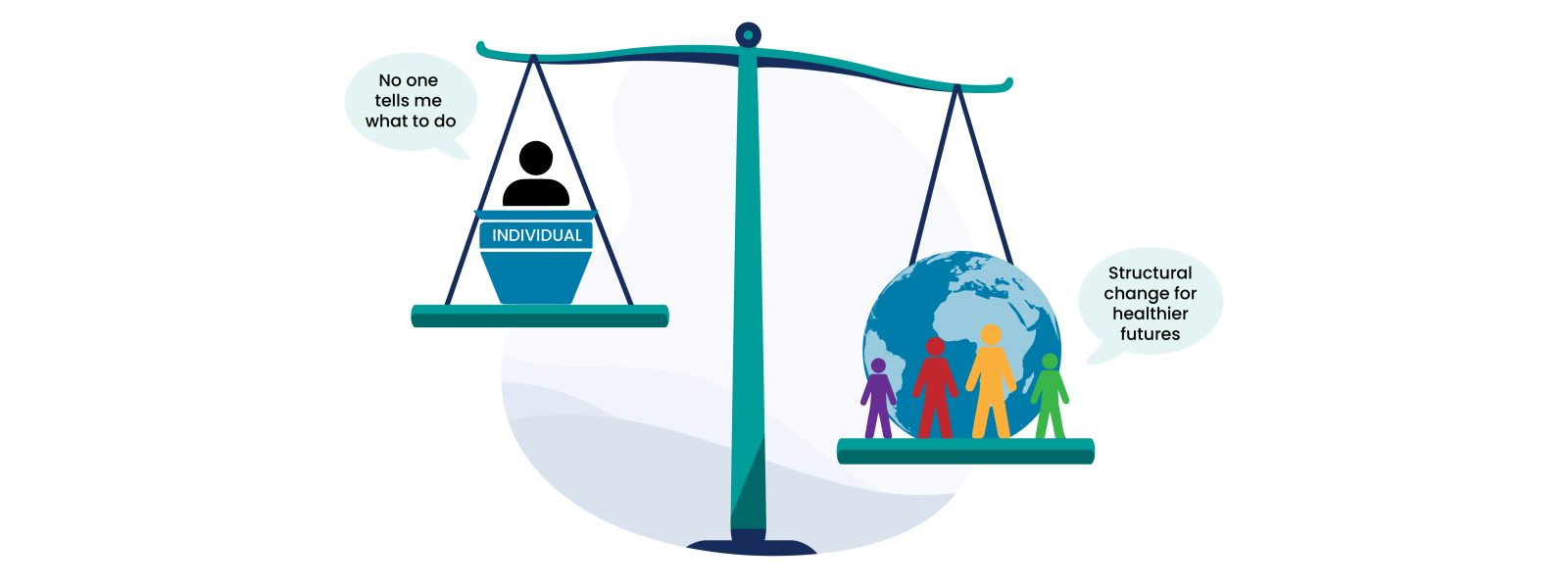Improving health is a political choice but how do we make it a shared political goal?

It was striking to read the devastating results of the last fifteen years of austerity policies on the future of the NHS in the recent BMJ Commission, all within less than nine pages [1]. The numbers are telling; declining life expectancy, deteriorating physical and mental health of young children, and increasing infant and child deaths disproportionately affecting the most deprived communities across the country. The authors argue that we can avoid children ending up in overburdened hospitals because of insufficient dental care, middle-aged people ‘self-medicating’ their despair with drugs or alcohol, and older people spending their later years in suffering due to failures in the health and social care systems. They highlight the political drivers of the problem and make clear that when it comes to how to improve health and reduce health inequalities, the evidence is right in front of us. What is lacking is the will for change.
Beyond offering a series of evidence-based recommendations on how to achieve change, the authors make an additional crucial point: we need to challenge the current political ideology. This ideology is based on narratives that portray staying healthy as an individual responsibility, label those with the worst health as irresponsible and undeserving, and state support as overprotective. The recent public debate concerning the new anti-smoking bill, which includes a ban on anyone born after 2009 ever being legally able to buy tobacco, is a case in point. Evidence shows that smoking is the single largest driver of health inequalities in England [2] and public health interventions that make health-positive choices easier are the most effective in reducing health inequalities [3]. Despite this evidence, certain media and politicians – building on the dominant narratives around health – have described the smoking ban as ‘health policing’ [4] or ‘an attack on personal freedoms’ [5].
Narratives are what we use to understand our world. The ability to control narratives is a form of power. The most powerful voices who promote limited state control have achieved the dominance of financial motives on society [6] and managed to make the economic angle the dominant one through which we should understand our problems and their solutions. This has been recently highlighted in policy aiming to tighten requirements for a sick note to reduce the number of people out of work due to ill-health. From the economic angle, the problem is not that people are ill, but that they are not active in the labour market. Accordingly, what prevents people from being active is not their ill-health but the state benefits, which disincentivise them from working. Therefore, to solve the problem we need to tackle the ‘sick note culture’ instead of sickness.
Along the lines of the economic argument, reducing health inequalities is often portrayed as ‘necessary to achieve a healthier economy’ requiring some pragmatic change. In the UK, the main political parties – increasingly converging around the dominance of the economic argument – appear to have a limited perspective on what is realistic change and what is possible in terms of improving health and narrowing health inequalities [7]. However, not everyone has such a limited perspective. People can see a future where better health for all is possible. Alternative narratives do exist and portray health as a goal in and of itself and not in relation to the markets and the economy. This is what we learn in the Health Equity Evidence Centre by working with communities.
During a discussion among our Citizens’ Panel, one of the members reflected, “we need to (re)imagine that you can be healthy and well regardless of the social group you belong to.” Narratives like this are those we need to uncover, elevate, and create to foster change [8] against a political ideology that makes us sick [9]. Although we all start from different places, many of us meet each other in communities and movements which demand investments in welfare, democratically run workplaces, decent housing, environmental justice, safety from (structural) violence and free universal healthcare. We need to foster these alliances and work together towards aligning health with justice, healing, solidarity, and compassion [10]. As our panel member highlighted, we need to challenge what is ‘realistic’ and allow imagination to inform our politics so that improving health for all becomes a shared political goal.
References
- Hiam L, Klaber B, Sowemimo A, Marmot M. NHS and the whole of society must act on social determinants of health for a healthier future. bmj. 2024;385.
- Action on Smoking and Health. Health Inequalities and Smoking [Internet]. Action on Smoking and Health; 2019 Sep [cited 2024 Apr 24]. Available from: https://ash.org.uk/uploads/ASH-Briefing_Health-Inequalities.pdf#page=1.25
- Davey F, McGowan V, Birch J, Kuhn I, Lahiri A, Gkiouleka A, et al. Levelling up health: a practical, evidence-based framework for reducing health inequalities. Public Health in Practice. 2022;4:100322.
- A smoking ban is pointless and illiberal. The Spectator [Internet]. 2024 Apr 20 [cited 2024 Apr 24];(20 April 2024). Available from: https://www.spectator.co.uk/article/a-smoking-ban-is-pointless-and-illiberal/
- Courea E. MPs vote for smoking ban despite Tories’ division over policy. The Guardian [Internet]. 2024 Apr 16 [cited 2024 Apr 20]; Available from: https://www.theguardian.com/politics/2024/apr/16/house-of-commons-votes-in-favour-of-smoking-ban-despite-opposition-from-dozens-of-tories#:~:text=Among%20those%20who%20voted%20against,in%20opposition%20to%20the%20bill.
- Epstein GA. Financialization and the world economy. Edward Elgar Publishing; 2005.
- McCracken A. Political parties reveal their health plans as campaigning for the next election gets under way [Internet]. King’s Fund Blog. Available from: https://www.kingsfund.org.uk/insight-and-analysis/blogs/political-parties-health-plans
- County Health Rankings and Roadmaps [Internet]. [cited 2024 Apr 24]. Narratives for Health. Available from: https://www.countyhealthrankings.org/strategies-and-solutions/narratives-for-health#:~:text=Transformative%20narratives%20align%20a%20set,a%20health%20equity%20narrative%20infrastructure.
- Schrecker T, Bambra C. How politics makes us sick: Neoliberal epidemics. Palgrave Macmillan; 2015.
- Segal L. Lean on Me: A Politics of Radical Care. Verso Books; 2023.
